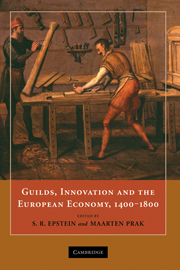Book contents
- Frontmatter
- Contents
- List of Contributors
- Acknowledgments
- Introduction: Guilds, Innovation, and the European Economy, 1400–1800
- 1 Craft Guilds, the Theory of the Firm, and Early Modern Proto-industry
- 2 Craft Guilds, Apprenticeship, and Technological Change in Pre-industrial Europe
- 3 Subcontracting in Guild-based Export Trades, Thirteenth–Eighteenth Centuries
- 4 Circulation of Skilled Labour in Late Medieval and Early Modern Central Europe
- 5 Painters, Guilds, and the Art Market during the Dutch Golden Age
- 6 Craft Guilds and Technological Change: The Engine Loom in the European Silk Ribbon Industry in the Seventeenth and Eighteenth Centuries
- 7 Guilds, Technology, and Economic Change in Early Modern Venice
- 8 Inventing in a World of Guilds: Silk Fabrics in Eighteenth-century Lyon
- 9 ‘Not to Hurt of Trade’: Guilds and Innovation in Horology and Precision Instrument Making
- 10 Reaching beyond the City Wall: London Guilds and National Regulation, 1500–1700
- 11 Guilds in Decline? London Livery Companies and the Rise of a Liberal Economy, 1600–1800
- Index
11 - Guilds in Decline? London Livery Companies and the Rise of a Liberal Economy, 1600–1800
Published online by Cambridge University Press: 24 June 2009
- Frontmatter
- Contents
- List of Contributors
- Acknowledgments
- Introduction: Guilds, Innovation, and the European Economy, 1400–1800
- 1 Craft Guilds, the Theory of the Firm, and Early Modern Proto-industry
- 2 Craft Guilds, Apprenticeship, and Technological Change in Pre-industrial Europe
- 3 Subcontracting in Guild-based Export Trades, Thirteenth–Eighteenth Centuries
- 4 Circulation of Skilled Labour in Late Medieval and Early Modern Central Europe
- 5 Painters, Guilds, and the Art Market during the Dutch Golden Age
- 6 Craft Guilds and Technological Change: The Engine Loom in the European Silk Ribbon Industry in the Seventeenth and Eighteenth Centuries
- 7 Guilds, Technology, and Economic Change in Early Modern Venice
- 8 Inventing in a World of Guilds: Silk Fabrics in Eighteenth-century Lyon
- 9 ‘Not to Hurt of Trade’: Guilds and Innovation in Horology and Precision Instrument Making
- 10 Reaching beyond the City Wall: London Guilds and National Regulation, 1500–1700
- 11 Guilds in Decline? London Livery Companies and the Rise of a Liberal Economy, 1600–1800
- Index
Summary
The notion that guilds were antithetical to the development of a capitalist economy has long held sway among English economic historians. Beginning with their most illustrious investigator, George Unwin, historians of the English guilds have assumed that these bodies, with regulatory powers over apprenticeship and working conditions, the authority to limit numbers working in a given trade or to set prices, and a supposed antipathy towards new technology, formed a barrier to economic progress and the advance of market relations. The shedding of these powers and the waning of guild authority over urban economies has been seen as a necessary step in England's development as an industrial and commercial nation. Although the decline of the guilds may have resulted in the loss of economic security by small-scale artisans and their transformation into wage labourers, this was an unfortunate side effect of economic progress. The decline of the guilds has been described in terms that assumed that this process of historical change was the outcome of the workings of underlying historical forces operating from the later sixteenth into the mid–eighteenth century. The story of decline describes the guilds as though they were organic bodies at the end of a life cycle. Unable to adapt to the new conditions and mentalities of the eighteenth century, guild structures became increasingly sclerotic, atrophied, and ‘out of date’.
- Type
- Chapter
- Information
- Guilds, Innovation and the European Economy, 1400–1800 , pp. 316 - 342Publisher: Cambridge University PressPrint publication year: 2008
- 12
- Cited by



